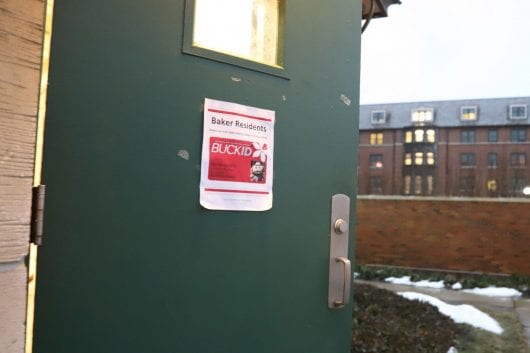
In an effort to increase security, a sign outside Baker Hall East informs students to use the main lobby doors to swipe into the building. Credit: Casey Cascaldo | Photo Editor
Ohio State Student Life Facility Services removed BuckID readers on the side doors at Baker Hall this semester to limit entrance into the residence hall to the main door.
The main goal of the restricted access is to help keep students safe and closer mimic the guidelines of newer dorms, Dave Isaacs, spokesman for the Office of Student Life, said.
“Residence halls constructed in recent years are designed to ensure that students entering the building pass by a staffed desk as a security precaution,” Isaacs said. “The work done at Baker is in line with that objective and was done as part of an overall upgrade of the BuckID infrastructure system across campus.”
The protocol for restricting access to the main door began with the South High-Rise Project in 2013, which affected the security measures at Park-Stradley, Seibert, and Smith-Steeb, Isaacs said.
Baker Hall, built in 1940 with the addition of Baker West in 1957, is a late addition to the university’s newest efforts to protect its students.
Isaacs said the removal of readers on side doors coincided with a larger project focused on BuckID infrastructure. He said that with work already being done on the infrastructure, it made sense to remove the side-door readers at the same time.
Despite the renovation’s positive intention, some students feel indifferent about the adjustment.
Megan Roth, a first-year in political science and Baker Hall resident, said the change made it less convenient to access the dorm, and while she said she doesn’t value convenience over safety, she felt there might be a better system that could have been implemented.
“I do wish there was a way they could’ve updated the system without denying access to every side door,” Roth said.
Isaacs said safety has more weight compared to convenience when it comes to students.
“The safety and security of our students is our top and primary concern,” Isaacs said.


